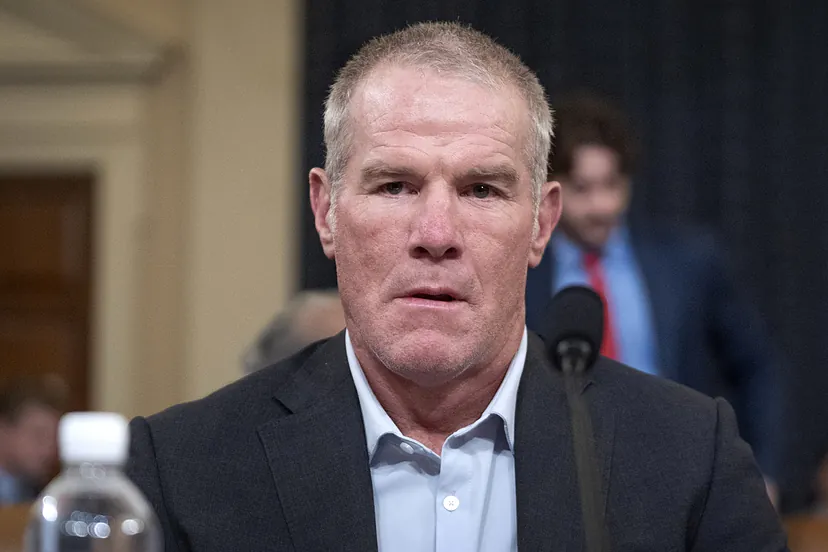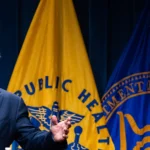Brett Favre, the iconic NFL Hall of Fame quarterback, is once again venturing into uncharted territory, but this time, the arena is far removed from the football field. Known for his legendary toughness, resilience, and an astonishing record of 299 consecutive starts, Favre is now confronting a different kind of formidable opponent: the early symptoms of what he believes to be Parkinson’s disease.
This challenging personal battle brings into sharp focus the often-hidden toll his extensive 20-year NFL career may have taken on his brain. Parkinson’s disease, a progressive neurodegenerative disorder, has been increasingly linked in research to traumatic brain injury (TBI) and repeated concussions, a common occupational hazard for professional football players.
In his pursuit of a proactive approach to managing these symptoms, the former Green Bay Packers icon has joined Ambio Life Sciences’ Neuroregenerative Program, based in Tijuana, Mexico. This bold move sees Favre exploring the potential of ibogaine treatment, a naturally occurring psychedelic compound, as a means to mitigate his early symptoms.
His involvement with this experimental program marks a significant development in the ongoing public conversation surrounding athlete brain health and the long-term consequences of head trauma in contact sports. Favre’s decision, given his public stature, promises to bring unprecedented attention to an area of medical science that remains both promising and highly debated.
Understanding Ibogaine and Ambio Life Sciences
Brett Favre’s commitment to the Ambio Life Sciences program shines a spotlight on ibogaine, a powerful substance with a complex standing in the medical community.
What is Ibogaine?
Ibogaine is a naturally occurring psychedelic compound derived from the root bark of the Tabernanthe iboga plant, native to West Central Africa. It has been used for centuries in traditional ceremonial practices for its psychoactive properties. In recent decades, scientific interest in ibogaine has grown due to its reported potential in treating various conditions.
Beyond its current exploration for neurodegenerative disorders, ibogaine is also being investigated as a potential component of treatment strategies for opioid addiction, traumatic brain injury (TBI), and even multiple sclerosis (MS).
Preclinical studies suggest that ibogaine and its metabolite, noribogaine, may stimulate the production of glial cell line-derived neurotrophic factor (GDNF), a crucial growth factor that supports dopamine-producing neurons, which are typically lost in Parkinson’s disease. This potential for neuroprotection and neuroregeneration is what makes it a compelling, albeit controversial, subject of research.
Favre’s Personal Experience and Reported Shift
Favre’s decision to undergo ibogaine treatment was significantly influenced by a personal recommendation. “I was told about ibogaine from a friend who completed the treatment,” Favre shared. He was evidently impressed by his friend’s outcome, stating he was “blown away by the results.” This anecdotal evidence provided the impetus for him to pursue the treatment himself.
Since commencing the program at Ambio’s facility in Tijuana, Mexico, Favre has reported notable improvements. “Since coming to Ambio, I’ve felt a real shift, especially in my sleep and energy,” he commented. These reported changes are significant, as sleep disturbances and fatigue are common non-motor symptoms of Parkinson’s disease and often severely impact quality of life. While these are early observations and not clinical trial results, Favre’s public endorsement lends considerable weight to the discussion around ibogaine’s potential.
The Ambio Life Sciences Neuroregenerative Program
Ambio Life Sciences positions itself as a leader in integrative ibogaine treatment. Their Neuroregenerative Program, specifically designed for patients with neurodegenerative conditions like Parkinson’s and multiple sclerosis, combines plant-based medicine with advanced neuroscience and clinical oversight.
The program, which soft-launched in February 2025 and has already supported 30 patients, aims to safely accommodate individuals with complex medical needs. It involves specialized protocols with optimized ibogaine dosing for tolerability and comprehensive therapeutic support delivered by a multidisciplinary team.
While Ambio does not claim to cure or reverse neurodegenerative diseases, its program focuses on offering a medically guided setting for patients to explore ibogaine as part of a broader health management strategy. The goal is to potentially help patients regain functionality and contribute to a growing body of real-world knowledge about the substance’s effects. The program’s approach is designed to be comprehensive, ensuring patient safety and support throughout the treatment process, particularly given the strong psychoactive properties of ibogaine.
The Hidden Cost of an NFL Career: Traumatic Brain Injury
Brett Favre’s decision to pursue experimental treatment directly correlates with his belief that his neurological symptoms are a direct consequence of his demanding NFL career.
The Reality of Repeated Concussions
Favre’s involvement with this experimental program marks a significant moment in the broader conversation surrounding athlete brain health. His reflections underscore the often-hidden, long-term costs of a professional sports career, particularly in high-impact sports like football.
Favre, renowned for his extraordinary resilience and physical durability throughout his 20 years in the NFL, has candidly admitted to The Washington Post that he likely suffered “hundreds” of concussions throughout his playing days. He even suggested the number was “far more than he would be able to count,” indicating the pervasive nature of head impacts in the sport, many of which may have gone undiagnosed or unreported at the time.
This admission highlights a critical issue: many former athletes are only now beginning to fully comprehend the severe long-term consequences of repeated head trauma. This understanding is expanding beyond traditional contact sports to include sports not typically associated with the same level of impact, such as soccer, where repetitive heading of the ball is now being investigated for its neurological effects. The cumulative effect of these repeated impacts, even “subconcussive” hits that don’t result in immediate symptoms, is increasingly linked to chronic neurological conditions.
Linking Football to Neurodegenerative Disease
Favre, now in his mid-50s, has publicly acknowledged experiencing various symptoms indicative of cognitive decline. These include struggles with short-term memory and instances of stuttering. He firmly believes these are directly linked to the countless hits and concussions sustained during his playing days. These symptoms align with those seen in various neurodegenerative disorders.
The most famous public example of Parkinson’s disease in a high-profile athlete is arguably Muhammad Ali, the iconic boxer who tragically passed away in 2016 after living with the condition for approximately 30 years. Ali’s prolonged battle with Parkinson’s, widely believed to be a result of the repetitive head trauma endured during his boxing career, serves as a stark reminder of the devastating potential impact of concussions on long-term brain health.
Favre’s situation echoes this unfortunate reality, adding another prominent voice to the growing chorus of former athletes facing similar challenges. The link between traumatic brain injury (TBI), particularly repeated concussive and subconcussive impacts, and the increased risk of developing neurodegenerative conditions like Parkinson’s and Chronic Traumatic Encephalopathy (CTE) is a rapidly evolving area of scientific research. While direct causation is complex, epidemiological studies increasingly show a correlation, with individuals with a history of moderate-to-severe TBI having a significantly elevated risk for Parkinson’s disease.
The Controversy and Future of Ibogaine Treatment
Despite the anecdotal positives, ibogaine treatment faces significant hurdles, particularly regarding its legal status and scientific validation.
Unapproved and Controversial Status
The Ambio program, while offering hope to patients like Favre, operates outside the mainstream medical framework in many countries. The treatment is not approved by the U.S. Food and Drug Administration (FDA). In the United States, ibogaine is classified as a Schedule I substance under the Controlled Substances Act, meaning it is considered to have a high potential for abuse and no currently accepted medical use. This classification severely limits research opportunities and makes it illegal to possess, produce, or distribute in most cases within the U.S.
Consequently, ibogaine remains controversial in medical circles. While proponents point to anecdotal evidence and preliminary research suggesting neuroprotective or neuroregenerative properties, the lack of large-scale, placebo-controlled clinical trials conducted under rigorous scientific standards in regulated environments means its efficacy and long-term safety for conditions like Parkinson’s are not yet definitively established.
There are also known risks, including potential cardiac and neurological side effects, which necessitate close medical supervision during treatment.
Favre’s Advocacy and Its Potential Impact
Despite the controversial nature of the treatment, Favre remains a vocal advocate. “I will say about it, it’s not necessarily the present, it’s life after and residual effects that so many people have spoken highly of,” Favre explained. He appears to be focusing on the potential for sustained, long-term benefits rather than immediate symptom reversal. His strong endorsement, “If you are contemplating it, come do it,” speaks volumes about his personal conviction.
Favre is not alone in seeking alternative treatments for neurological conditions. Other high-profile figures, such as country music star Clay Walker, who battles multiple sclerosis (MS), have also reportedly turned to ibogaine treatment and claimed improvements. Walker has spoken about significant relief from symptoms like the “MS hug” (a painful tightness in the abdomen) and improved clarity and focus after his ibogaine journey.
Nevertheless, without formal FDA approval and more robust clinical evidence, ibogaine’s path to widespread medical acceptance remains uncertain. However, Favre’s advocacy, as a household name and respected figure within the NFL community, could significantly signal a shift in public perception and medical discourse.
His willingness to openly share his personal journey may encourage other athletes and individuals facing long-term neurological effects from their careers to prioritize their long-term health over immediate performance or societal stigma. This transparency can spur further research and investment into alternative therapies for brain health.
“For athletes facing long-term effects from their careers,” Favre concluded, “Ibogaine is something worth looking into.” His voice, given its prominence, may well catalyze a much-needed broader conversation and potentially even pave the way for more regulated research into substances like ibogaine.
Broader Implications for Athlete Health and Medical Research
Brett Favre’s public disclosure and pursuit of ibogaine treatment underscore critical broader implications for athlete well-being and the future of neurodegenerative disease research.
Shifting Perspectives on Athlete Longevity
For decades, the physical demands of professional sports, particularly football, have been immense, often leading to career-ending injuries. However, the growing understanding of chronic traumatic encephalopathy (CTE) and other neurodegenerative conditions has shifted the focus from immediate physical injuries to the long-term brain health of athletes. Favre’s experience is a stark reminder that the impact of a high-contact career extends far beyond retirement.
His willingness to speak openly about his struggles with memory and speech breaks down stigma and encourages other athletes, current and retired, to prioritize their cognitive health. This transparency contributes to a cultural shift within sports, prompting leagues, teams, and players to invest more seriously in brain injury prevention, diagnosis, and treatment protocols.
Driving Innovation in Neuroregenerative Therapies
The increasing number of high-profile athletes like Favre seeking unconventional treatments also highlights a significant gap in conventional medicine for neurodegenerative conditions. Currently, there are no cures for diseases like Parkinson’s, and existing treatments primarily focus on symptom management. This unmet medical need drives individuals to explore alternative and experimental therapies.
Favre’s involvement with Ambio Life Sciences and their neuroregenerative program, while controversial due to ibogaine’s unapproved status, underscores a burgeoning interest in novel approaches to neurological repair. The idea of using plant-based compounds to “regenerate damaged neural tissue” represents a bold frontier in neuroscience.
While the scientific community rightly demands rigorous clinical trials for validation, the public endorsements from figures like Favre and Clay Walker inevitably draw attention and potentially stimulate more funding and research into these areas. This pressure from prominent individuals can accelerate the investigation of substances that, while currently classified as illicit or unproven, may hold therapeutic potential for devastating conditions.
The ongoing dialogue around ibogaine, fueled by such endorsements, could eventually lead to its reclassification and further scientific exploration under controlled, ethical conditions, ultimately broadening the scope of available treatments for complex neurological disorders.








